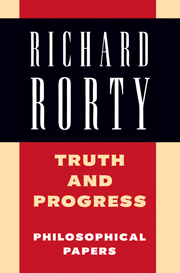Book contents
- Frontmatter
- Contents
- Introduction
- I Truth and Some Philosophers
- 1 Is Truth a Goal of Inquiry? Donald Davidson versus Crispin Wright
- 2 Hilary Putnam and the Relativist Menace
- 3 John Searle on Realism and Relativism
- 4 Charles Taylor on Truth
- 5 Daniel Dennett on Intrinsicality
- 6 Robert Brandom on Social Practices and Representations
- 7 The Very Idea of Human Answerability to the World: John McDowell's Version of Empiricism
- 8 Antiskeptical Weapons: Michael Williams versus Donald Davidson
- II Moral Progress: Toward More Inclusive Communities
- III The Role of Philosophy in Human Progress
- Index
2 - Hilary Putnam and the Relativist Menace
Published online by Cambridge University Press: 06 July 2010
- Frontmatter
- Contents
- Introduction
- I Truth and Some Philosophers
- 1 Is Truth a Goal of Inquiry? Donald Davidson versus Crispin Wright
- 2 Hilary Putnam and the Relativist Menace
- 3 John Searle on Realism and Relativism
- 4 Charles Taylor on Truth
- 5 Daniel Dennett on Intrinsicality
- 6 Robert Brandom on Social Practices and Representations
- 7 The Very Idea of Human Answerability to the World: John McDowell's Version of Empiricism
- 8 Antiskeptical Weapons: Michael Williams versus Donald Davidson
- II Moral Progress: Toward More Inclusive Communities
- III The Role of Philosophy in Human Progress
- Index
Summary
In his Realism with a Human Face, Hilary Putnam says that he is “often asked just where I disagree with Rorty.” I am often asked the converse question. People ask us these questions because Putnam and I agree on a number of points that a lot of other philosophers do not accept.
For example, I wholeheartedly agree with what Putnam says in the following passages:
(I) “… elements of what we call ‘language’ or ‘mind’ penetrate so deeply into what we call ‘reality’ that the very project of representing ourselves as being ‘mappers’ of something ‘language-independent’ is fatally compromised from the start. Like Relativism, but in a different way, Realism is an impossible attempt to view the world from Nowhere.”
(II) “[We should] accept the position we are fated to occupy in any case, the position of beings who cannot have a view of the world that does not reflect our interests and values, but who are, for all that, committed to regarding some views of the world – and, for that matter, some interests and values – as better than others.”
(III) “What Quine called ‘the indeterminacy of translation’ should rather be viewed as the ‘interest relativity of translation.’… ‘[I] merest relativity’ contrasts with absoluteness, not with objectivity. It can be objective that an interpretation or an explanation is the correct one, given the interests which are relevant in the context.”
[…]
- Type
- Chapter
- Information
- Truth and ProgressPhilosophical Papers, pp. 43 - 62Publisher: Cambridge University PressPrint publication year: 1998
- 17
- Cited by



